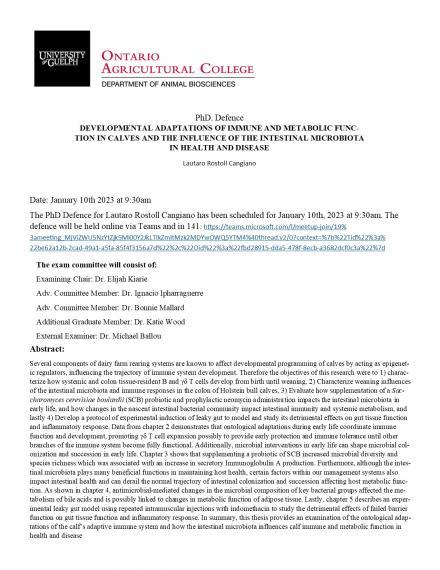Lautaro Rostoll Cangiano's PhD Defence
Date and Time
Location
Room 141 and Teams: https://teams.microsoft.com/l/meetup-join/19%3ameeting_MjViZWU5NzYtZjk5Mi00Y2JkLTlkZmItMzk2MDYwOWQ5YTM4%40thread.v2/0?context=%7b%22Tid%22%3a%22be62a12b-2cad-49a1-a5fa-85f4f3156a7d%22%2c%22Oid%22%3a%22fbd28915-dda5-478f-8ecb-a3682dcf0c3a%22%7d

Details
Several components of dairy farm rearing systems are known to affect developmental programming of calves by acting as epigenet-ic regulators, influencing the trajectory of immune system development. Therefore the objectives of this research were to 1) charac-terize how systemic and colon tissue-resident B and γδ T cells develop from birth until weaning, 2) Characterize weaning influences of the intestinal microbiota and immune responses in the colon of Holstein bull calves, 3) Evaluate how supplementation of a Sac-charomyces cerevisiae boulardii (SCB) probiotic and prophylactic neomycin administration impacts the intestinal microbiota in early life, and how changes in the nascent intestinal bacterial community impact intestinal immunity and systemic metabolism, and lastly 4) Develop a protocol of experimental induction of leaky gut to model and study its detrimental effects on gut tissue function and inflammatory response. Data from chapter 2 demonstrates that ontological adaptations during early life coordinate immune function and development, promoting γδ T cell expansion possibly to provide early protection and immune tolerance until other branches of the immune system become fully functional. Additionally, microbial interventions in early life can shape microbial col-onization and succession in early life. Chapter 3 shows that supplementing a probiotic of SCB increased microbial diversity and species richness which was associated with an increase in secretory Immunoglobulin A production. Furthermore, although the intes-tinal microbiota plays many beneficial functions in maintaining host health, certain factors within our management systems also impact intestinal health and can derail the normal trajectory of intestinal colonization and succession affecting host metabolic func-tion. As shown in chapter 4, antimicrobial-mediated changes in the microbial composition of key bacterial groups affected the me-tabolism of bile acids and is possibly linked to changes in metabolic function of adipose tissue. Lastly, chapter 5 describes an exper-imental leaky gut model using repeated intramuscular injections with indomethacin to study the detrimental effects of failed barrier function on gut tissue function and inflammatory response. In summary, this thesis provides an examination of the ontological adap-tations of the calf’s adaptive immune system and how the intestinal microbiota influences calf immune and metabolic function in health and disease